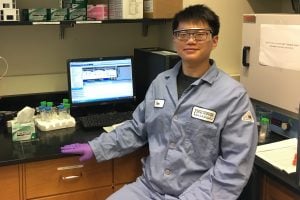
For an engineer who loves basic science like fourth-year PhD candidate Hao Su, the specifics of a research project are just one avenue into the heart of the matter: understanding the fundamentals behind the phenomena revealed by the investigation.
Su’s current pursuits revolve around conjugating hydrophilic peptides with hydrophobic anti-cancer medicines to create new forms of the drug that last longer within the body and better target tumors. Su and his lab colleagues hope to develop a product that will compete with the current commercially available one, a small-molecule drug that can be toxic to organs and has a low response rate. Due to its nano size, the group’s experimental drug has longer circulation time in the body, and acts by self-assembling into nanostructures that selectively target individual tumors.
“The concept is trying to use peptides to manipulate the pharmacokinetics and pharmacodynamics of the drug to make better therapy,” Su says.
Passionate though he is about the drug’s potential to improve patients’ quality of life, cancer therapy has not always been Su’s focus. Having earned bachelor’s and master’s degrees in polymer science and engineering at Sichuan University and the University of Akron, respectively, the native of China’s Jiangsu province sees himself as a materials scientist first and foremost. Interested in the relationship between the fundamentals of materials and the outcomes of their various applications, he knows he can apply the same approach he uses to understand anti-cancer drugs to other pharmaceuticals or even to other areas, such as energy.
“Applications are all based on the fundamentals,” Su says. “I really enjoy the art in self-assembly; no matter whether it’s peptides or polymers or other materials, self-assembly is useful by nature.”
Su also enjoys the camaraderie of his ChemBE lab, with frequent discourse among lab members, constant collaboration with colleagues at Johns Hopkins’ School of Medicine, social outings, and a high-energy PI who always has a different angle or fresh idea to offer.
Su aspires to a similar role in the future. Hoping to continue to explore material fundamentals unfettered by industry-driven profit motives, he plans to enter academia and follow his interests wherever they may take him next.
“Sometimes big discoveries come from this kind of free research,” Su says.